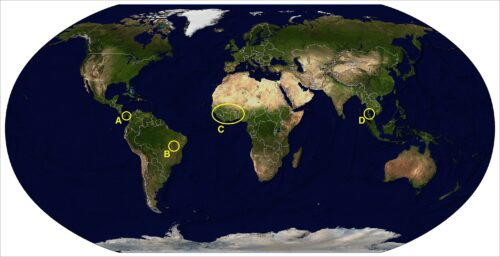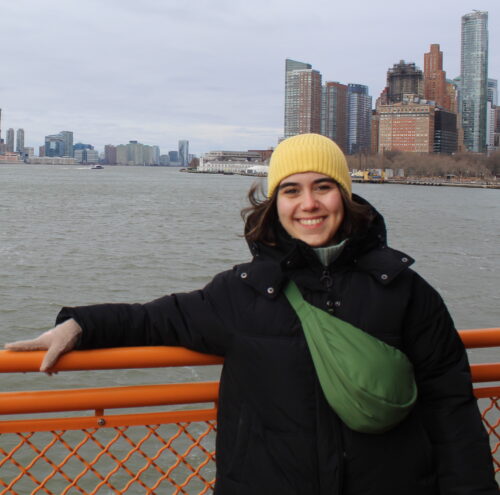When I send Adela Cebeiro an email asking to interview her about Wikipedia, I get an out of office message that she’s doing fieldwork in South Africa. Considering I’m writing to ask her about her experience in Justin Pargeter’s African Prehistory course at New York University, I’m impressed but not surprised.
Adela just finished the first year of her PhD. “I like to say that I am both an archaeologist and an anthropologist who specializes in primate archaeology,” she says when we are able to connect. Her current field work and what I’m writing to her about are closely related. Adela wrote the book on primate archaeology. Well, she wrote the Wikipedia article anyway.

As part of Justin Pargeter’s course, Adela and classmates were to develop content-rich and well-researched Wikipedia articles dealing with African archaeological sites and related topics. Adela saw it as a great opportunity to build upon her existing interests.

“My current work and fieldwork are directly associated with my Wikipedia assignment. I have always been extremely interested in the study of human evolution with a particular interest in the anatomical and cognitive diversity of early hominins,” she shares. “During my academic career, I have specialized in the analysis of lithic technology and how the use of different technologies affected hominin adaptive strategies. Although I love archaeology and the opportunity to interpret the past through material objects, I wanted to expand my knowledge and interests into new avenues of research that could help me to better connect past actions with their material evidence. For me, primate archaeology was the solution I was looking for.”
Adela quickly discovered, much to her surprise, that no Wikipedia article on the subject existed. Sure, there were some on related topics (e.g., Lomekwi, Kanzi), but none about the field as a whole.
“I realized what would inspire and challenge me the most would be to write a completely new page for primate archaeology,” she shares.
The Wikipedia assignment allows for creativity and personal interest to guide the process. In Adela’s case, it was an opportunity to build upon her PhD research.
“I have always been interested in the study of human evolution. Moreover, I love interdisciplinarity. Thus, a field like primate archaeology that merges multiple fields such as primatology and archaeology seemed like a perfect fit for my academic career. Writing a page about primate archaeology felt like the most reasonable next step in that career.”
As Adela began, she discovered that defining the scope of the article allowed her to participate in a larger conversation within academia about the field itself.

“For me, the most important takeaway from my article is the fact that primate archaeology studies both the present behavior of extant non-human primates and their associated material culture. Thanks to this particular characteristic, primate archaeology is capable of contributing to the study of human evolution because it allows us to try to connect material culture with observed behaviors. An important limitation archaeology faces is that behavior does not fossilize; thus, archaeologists have to reconstruct past actions only through archaeological materials. In my opinion, primate archaeology is a step forward in trying to overcome this limitation for certain temporal periods. Furthermore, I believe that the success primate archaeological research is gaining reflects how the connection of different disciplines into a new one can be a very fruitful endeavor!”
Wikipedia itself is inherently interdisciplinary. Topics connect and connect, leading readers down rabbit-holes of discovery. The curiosity that that process inspires is similar for many of Wikipedia’s volunteer editors, who follow their passions and improve Wikipedia content as an act of creativity for the public good.
“After being part of Wikipedia and seeing how it works, I can confidently say that it is an extremely powerful tool for scientific communication. Not only does it allow experts to share their knowledge with the general public, but it could also become a platform in which to discuss and contrast ideas through the ‘talk’ page that comes with every Wikipedia article. Moreover, from the public perspective, Wikipedia is an accessible platform where to find answers to almost any question. Through the expansion of already existing articles and the creation of new ones, the power of Wikipedia could be expanded even further. Scientific knowledge should not be kept in a small circle of experts but rather it should be shared with as many people as possible. Wikipedia is a great tool to help make this feasible.”
“I think this type of assignment is extremely useful for both undergraduate and graduate courses at a university level. Writing a Wikipedia page instead of the more commonly known term paper has given me the opportunity to share my knowledge with the general public in a way that I could not have done otherwise. Moreover, writing a Wikipedia page about primate archaeology has helped me to begin to contribute to this growing discipline with a different and fresh angle that has not gone unnoticed. Overall, I believe writing a Wikipedia page should become the new version of a term paper. It is time to let students actively and publicly contribute to the growth of knowledge in those areas they are most passionate about.”
Interested in incorporating a Wikipedia assignment into your course? Visit teach.wikiedu.org to learn more about the free assignment templates and resources that Wiki Education offers to instructors in the United States and Canada.
